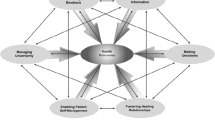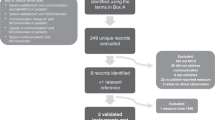Abstract
Background
In medical oncology, palliative care principles and advance care planning are often discussed later in illness, limiting time for conversations to guide goal-concordant care. In pediatric oncology, the frequency, timing and content of communication about palliative care principles and advance care planning remains understudied.
Methods
We audio-recorded serial disease re-evaluation conversations between oncologists, children with advancing cancer and their families across the illness trajectory until death or 24 months from last disease progression. Content analysis was conducted to determine topic frequencies, timing and communication approaches.
Results
One hundred forty one disease re-evaluation discussions were audio-recorded for 17 patient–parent dyads with advancing cancer. From 2400 min of recorded dialogue, 119 min (4.8%) included discussion about palliative care principles or advance care planning. Most of this dialogue occurred after frank disease progression. Content analysis revealed distinct communication approaches for navigating discussions around goals of care, quality of life, comfort and consideration of limiting invasive interventions.
Conclusions
Palliative care principles are discussed infrequently across evolving illness for children with progressive cancer. Communication strategies for navigating these conversations can inform development of educational and clinical interventions to encourage earlier dialogue about palliative care principles and advance care planning for children with high-risk cancer and their families.
This is a preview of subscription content, access via your institution
Access options
Subscribe to this journal
Receive 24 print issues and online access
$259.00 per year
only $10.79 per issue
Buy this article
- Purchase on Springer Link
- Instant access to full article PDF
Prices may be subject to local taxes which are calculated during checkout



Similar content being viewed by others
Data availability
Researchers interested exploring the raw data may reach out to Dr. Erica Kaye/Division of Quality of Life and Palliative Care/Department of Oncology/St. Jude Children’s Research Hospital/262 Danny Thomas Place, Mail Stop 260, Memphis, TN 38105/Office: 901-595-8188/Fax: 901-595-9005/Email: erica.kaye@stjude.org. These raw data comprise audio-recordings of serial medical conversations; in the setting of the rarity of advancing pediatric cancer, we believe that a small risk exists for participant identification even following rigorous de-identification of transcripts. Given this risk, we are not planning to share entire raw datasets upfront to all-comers. We will be glad to consider sharing de-identified data on a case-by-case basis with researchers under a data-sharing agreement, as specified by our Institutional Review Board.
References
Gillick MR. Advance care planning. N Engl J Med. 2004;350:7–8.
Narang AK, Wright AA, Nicholas LH. Trends in advance care planning in patients with cancer. JAMA Oncol. 2015;1:601–8.
Tulsky JA, Beach MC, Butow PN, Hickman SE, Mack JW, Morrison RS, et al. A research agenda for communication between health care professionals and patients living with serious illness. JAMA Intern Med. 2017;177:1361–6.
Lagman R, Walsh D. Integration of palliative medicine into comprehensive cancer care. Semin Oncol. 2005;32:134–8.
Kavalieratos D, Corbelli J, Zhang D, Dionne-Odom JN, Ernecoff NC, Hanmer J, et al. Association between palliative care and patient and caregiver outcomes. JAMA. 2016;316:2104–14.
Temel JS, Greer JA, Muzikansky A, Gallagher ER, Admane S, Jackson VA, et al. Early palliative care for patients with metastatic non-small-cell lung cancer. N Engl J Med. 2010;363:733–42.
Zimmermann C, Swami N, Krzyzanowska M, Hannon B, Leighl N, Oza A, et al. Early palliative care for patients with advanced cancer: a cluster-randomised controlled trial. Lancet. 2014;383:1721–30.
Grudzen CR, Richardson LD, Johnson PN, Hu M, Wang B, Ortiz JM, et al. Emergency department–initiated palliative care in advanced cancer. JAMA Oncol. 2016;2:591–8.
Kassam A, Skiadaresis J, Alexander S, Wolfe J. Differences in end-of-life communication for children with advanced cancer who were referred to a palliative care team. Pediatr Blood Cancer. 2015;62:1409–13.
Vollenbroich R, Duroux A, Grasser M, et al. Effectiveness of a pediatric palliative home care team as experienced by parents and health care professionals. J Palliat Med. 2012;15:294–300.
Groh G, Feddersen B, Führer M, Brandstatter M, Domenico Borasio G, Fuhrer M. Specialized home palliative care for adults and children: differences and similarities. J Palliat Med. 2014;17:803–10.
Hays RM, Valentine J, Haynes G, Geyer JR, Villareale N, McKinstry B, et al. The Seattle Pediatric Palliative Care Project: effects on family satisfaction and health-related quality of life. J Palliat Med. 2006;9:716–28.
Friedrichsdorf SJ, Postier A, Dreyfus J, Osenga K, Sencer S, Wolfe J. Improved quality of life at end of life related to home-based palliative care in children with cancer. J Palliat Med. 2015;18:143–50.
Ullrich CK, Lehmann L, London WB, Guo D, Sridharan M, Koch R, et al. End-of-life care patterns associated with pediatric palliative care among children who underwent hematopoietic stem cell transplant. Biol Blood Marrow Transpl. 2016;22:1049–55.
Tulsky JA. Beyond advance directives. JAMA. 2005;294:359–65.
Silveira MJ, Kim SYH, Langa KM. Advance directives and outcomes of surrogate decision making before death. N Engl J Med. 2010;362:1211–8.
Villalobos M, Siegle A, Hagelskamp L, Jung C, Thomas M. Communication along milestones in lung cancer patients with advanced disease. Oncol Res Treat. 2019;42:41–46.
Thomas TH, Jackson VA, Carlson H, Rinaldi S, Sousa A, Hansen A, et al. Communication differences between oncologists and palliative care clinicians: a qualitative analysis of early, integrated palliative care in patients with advanced cancer. J Palliat Med. 2019;22:41–49.
Siegle A, Villalobos M, Bossert J, Krug K, Hagelskamp L, Krisam J, et al. The Heidelberg Milestones Communication Approach (MCA) for patients with prognosis <12 months: protocol for a mixed-methods study including a randomized controlled trial. Trials. 2018;19:438.
Greenzang KA, Cronin AM, Kang TI, Mack JW. Parental distress and desire for information regarding long‐term implications of pediatric cancer treatment. Cancer. 2018;124:4529–37.
Mack JW, Fasciano KM, Block SD. Communication about prognosis with adolescent and young adult patients with cancer: information needs, prognostic awareness, and outcomes of disclosure. J Clin Oncol. 2018;36:1861–7.
Greenzang KA, Cronin AM, Kang T, Mack JW. Parent understanding of the risk of future limitations secondary to pediatric cancer treatment. Pediatr Blood Cancer. 2018;65:e27020.
Sisk BA, Kang TI, Mack JW. Prognostic disclosures over time: parental preferences and physician practices. Cancer. 2017;123:4031–8.
Kaye E, Snaman J, Johnson L, Levine D, Powell B, Love A, et al. Communication with Children with Cancer and their Families throughout the Illness Journey and at the End of Life. In: Wolfe J, Jones BL, Kreicbergs U, Jankovic M Cham, editors. Palliative Care in Pediatric Oncology. Switzerland: Springer, 2017.
Tong A, Sainsbury P, Craig J. Consolidated criteria for reporting qualitative research (COREQ): a 32-item checklist for interviews and focus groups. Int J Qual Heal Care. 2007;19:349–57.
Kaye EC, Gattas M, Bluebond-Langner M, Baker JN. Longitudinal investigation of prognostic communication: feasibility and acceptability of studying serial disease reevaluation conversations in children with high-risk cancer. Cancer. 2020;126:131–9.
Kaye EC, Stall M, Woods C, Velrajan S, Gattas M, Lemmon M, et al. Prognostic communication between oncologists and parents of children with advanced cancer. Pediatrics. 2021;147:e2020044503.
Schönfelder W. CAQDAS and Qualitative Syllogism Logic-NVivo 8 and MAXQDA 10 Compared. Forum Qual Soc Res. 2021. https://doi.org/10.17169/fqs-12.1.1514.
Korstjens I, Moser A. Series: Practical guidance to qualitative research. Part 4: Trustworthiness and publishing. Eur J Gen Pract. 2018;24:120–4.
Krippendorff K. Content Analysis: An Introduction to its Methodology. Newbury Park: SAGE Publications; 1980.
Dhollander N, De Vleminck A, Deliens L, Van, Belle S, Pardon K. Barriers to the early integration of palliative home care into the disease trajectory of advanced cancer patients: a focus group study with palliative home care teams. Eur J Cancer Care (Engl.). 2019;28:e13024.
Janah A, R. Gauthier L, Morin L, Jean Bousquet P, Le Bihan C, Tuppin P, et al. Access to palliative care for cancer patients between diagnosis and death: a national cohort study. Clin Epidemiol. 2019;11:443–55.
Sorensen A, Wentlandt K, Le LW, Swami N, Hannon B, Rodin G, et al. Practices and opinions of specialized palliative care physicians regarding early palliative care in oncology. Support Care Cancer. 2020;28:877–85.
Caissie A, Kevork N, Hannon B, Li LW, Zimmerman C. Timing of code status documentation and end-of-life outcomes in patients admitted to an oncology ward. Support Care Cancer. 2014;22:375–81.
Kaye EC, Jerkins J, Gushue CA, DeMarsh S, Sykes A, Lu Z, et al. Predictors of late palliative care referral in children with cancer. J Pain Symptom Manag. 2018;55:1550–6.
Kaye EC, Snaman JM, Baker JN. Pediatric palliative oncology: bridging silos of care through an embedded model. J Clin Oncol. 2017;35:2740–4.
Mack JW, Joffe S. Communicating about prognosis: ethical responsibilities of pediatricians and parents. Pediatrics. 2014;133:S24–30.
Helft PR. Necessary collusion: prognostic communication with advanced cancer patients. J Clin Oncol. 2005;23:3146–50.
Levine DR, Mandrell BN, Sykes A, Pritchard M, Gibson D, Symons HJ, et al. Patients’ and parents’ needs, attitudes, and perceptions about early palliative care integration in Pediatric Oncology. JAMA Oncol. 2017;3:1214–20.
Mack JW, Wolfe J, Cook EF, Grier HE, Cleary PD, Weeks JC. Hope and prognostic disclosure. J Clin Oncol. 2007;25:5636–42.
Acknowledgements
We thank Timothy Hammond for his assistance with figure development.
Funding
This work is supported by Dr. Kaye’s Career Development Award from the National Palliative Care Research Center and by ALSAC. Additionally, MEL receives salary support from the National Institute of Neurological Disorders and Stroke (K23NS116453).
Author information
Authors and Affiliations
Contributions
ECK conceptualised and designed the study, coordinated and supervised data collection, carried out the analyses, drafted the initial manuscript and revised the manuscript. CW and MG collected data, coded data, assisted with analyses and critically reviewed the manuscript for important intellectual content. KK, SV, TB and RH coded data, assisted with analyses and critically reviewed the manuscript for important intellectual content. MEL critically reviewed the analyses and reviewed and revised the manuscript to improve content and presentation of data. JNB conceptualised the study, participated in coding and critically reviewed the manuscript for important intellectual content. JWM conceptualised the study, critically reviewed the analyses and reviewed and revised the manuscript to improve content and presentation of data. All authors approved the final manuscript as submitted and agree to be accountable for all aspects of the work.
Corresponding author
Ethics declarations
Ethics approval and consent to participate
This study was reviewed and approved by the Institutional Review Board at St. Jude Children’s Research Hospital [U-CHAT (Pro00006473); approval date: 7/12/2016]. This study was performed in accordance with the Declaration of Helsinki.
Consent for publication
No individual person’s data containing identifiable information are included in this manuscript.
Competing interests
MEL has received compensation for medicolegal work. All other authors declare no competing interests.
Additional information
Publisher’s note Springer Nature remains neutral with regard to jurisdictional claims in published maps and institutional affiliations.
Supplementary information
Rights and permissions
About this article
Cite this article
Kaye, E.C., Woods, C., Kennedy, K. et al. Communication around palliative care principles and advance care planning between oncologists, children with advancing cancer and families. Br J Cancer 125, 1089–1099 (2021). https://doi.org/10.1038/s41416-021-01512-9
Received:
Revised:
Accepted:
Published:
Issue Date:
DOI: https://doi.org/10.1038/s41416-021-01512-9



